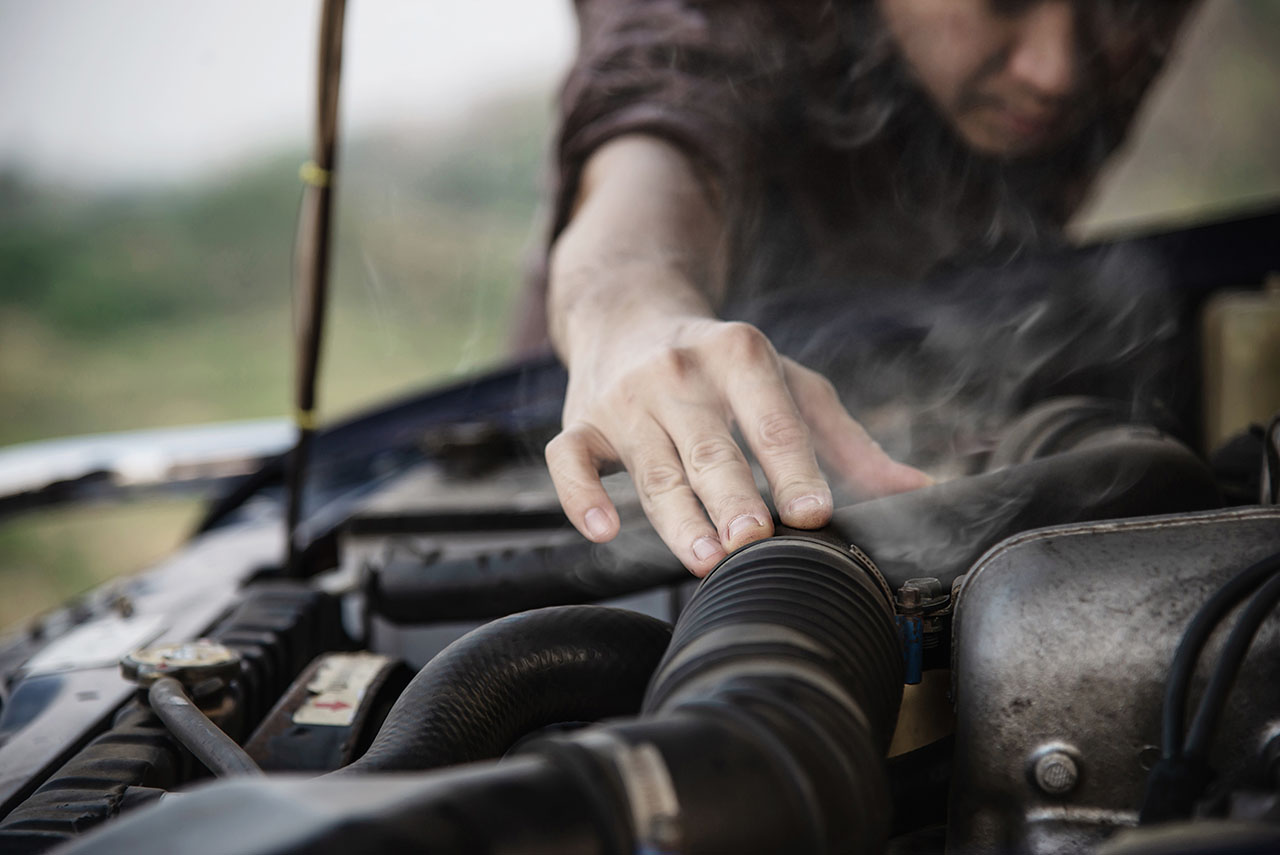As a car owner, you know that your vehicle is more than just a mode of transportation; it’s a crucial part of your daily life that requires care and attention. Regular maintenance can mean the difference between a smooth ride and unexpected roadside stops. But when life gets hectic, it’s easy to miss the subtle signals that your car needs a check-up. One such signal is an oil leak — a common yet often misunderstood issue that can crop up in vehicles of any age.
At One-Click Towing Company, based right here in the heart of Cincinnati, we’ve seen our fair share of vehicles sidelined by oil leaks. Our team understands that an oil leak is not just a messy inconvenience but a potential cry for help from your engine. With our comprehensive towing and roadside assistance services, we’ve helped countless drivers who’ve been caught off guard by sudden car troubles. But we firmly believe in empowering our customers with knowledge to prevent such problems before they require a tow.
In this article, we’ll delve into the different messages your car might be sending you with an oil leak, what it means for your vehicle’s health, and how you can address it. From the minor drips that signify a small issue to the significant puddles that indicate a major problem, understanding these signs can save you time, money, and ensure your safety on the road.
Understanding Oil Leaks
Before we get into the implications of an oil leak, it’s crucial to understand why your car needs oil in the first place. Oil is the lifeblood of your car’s engine, serving multiple vital functions:
- Lubrication: Oil reduces friction between moving parts, preventing wear and overheating.
- Cooling: It helps to carry away some of the heat produced by the combustion process.
- Cleaning: Oil picks up debris and contaminants within the engine, moving them to the oil filter.
- Protection: It provides a protective layer between engine components to prevent corrosion.
When your car leaks oil, it’s failing to perform these essential functions as effectively, which can lead to engine damage over time.
What Could Be Causing the Leak?
An oil leak can have several causes, each indicating a different type of problem:
- Worn-out gaskets or seals: The most common cause of oil leaks. Over time, engine gaskets and seals can dry out, shrink, or crack, leading to oil escaping.
- Damaged oil pan: The oil pan can suffer from corrosion or get punctured by road debris, leading to a leak.
- Improperly installed filters: If an oil filter is not fitted correctly, oil can seep out.
- Degraded engine oil cooler lines: These lines can corrode or get damaged, causing a leak.
- Turbocharger: Bearing or seal failure, or excessive pressure can lead to not only oil leaking onto the ground, but also into the intake or exhaust system.
- Rear Main Seal: This seal is located where the engine and transmission meet. A leak here can often be mistaken for a transmission leak.
Assessing the Severity of Oil Leaks
When it comes to oil leaks, not all are created equal. The severity of the leak can vary greatly, and understanding the level of urgency associated with each type can help you prioritize your response.
Let’s explore the different levels of oil leaks and what they could mean for your vehicle:
Minor Seepage
Characteristics: A light coating of oil, often found around gaskets or seals, but with no drips.
Implications: This is the least urgent type of oil leak. It often occurs in older vehicles and may not require immediate attention. However, it’s a sign to monitor your oil levels more closely and prepare for future repairs.
Recommended Action: Schedule a check-up at your convenience.
Moderate Leak
Characteristics: Small drops forming under the car or a wet stain on the pavement after parking.
Implications: A moderate leak can lead to a gradual decline in oil levels, potentially causing engine issues if left unchecked.
Recommended Action: Plan to address the issue within a week or two, monitoring oil levels in the meantime.
Severe Leak
Characteristics: A steady stream of oil or a large puddle forming under your car.
Implications: A severe leak is critical and indicates a major issue. The vehicle may lose oil too quickly for safe operation, which can lead to engine damage if the car is driven.
Recommended Action: Cease driving the vehicle and arrange for immediate repair. If necessary, have the vehicle towed to a service center to prevent engine damage and ensure safety.
Catastrophic Leak
Characteristics: Large amounts of oil spilling out rapidly, often accompanied by smoke or a burning smell.
Implications: This is an emergency situation. A catastrophic leak often means there is major engine damage or failure of a vital component like the oil pan or major gaskets.
Recommended Action: Stop the vehicle as soon as it’s safe to do so. Do not attempt to drive the car any further. Contact a towing service immediately to transport your car to a professional mechanic.
Identifying the Severity
To determine the severity of an oil leak, consider these factors:
- Volume: How much oil is being lost? The more oil on the ground, the more severe the leak.
- Location: Where is the oil coming from? Some areas may indicate more severe problems than others.
- Color and Texture: Fresh oil is typically light brown and thin, while older oil may be darker and thicker. Transmission fluid leaks, which are often mistaken for oil leaks, are typically red or green.
Want to know the other top causes vehicle failure besides oil leaking? Check out this article…
The Risks of Ignoring an Oil Leak
Neglecting the signs of an oil leak can be tempting, especially when immediate consequences aren’t obvious. Go to any parking spot, anywhere, and you’ll see plenty of oil spots where drivers have done just that.
However, ignoring an oil leak can be likened to ignoring a ‘check engine’ light—a signal that something is amiss that could potentially worsen if not promptly addressed. Here’s how delaying action on an oil leak can exacerbate the issue:
Compounded Engine Wear
Oil is not merely a lubricant; it’s a vital component in the complex ecosystem of your engine. A leak leads to lower oil levels, which means there’s less oil to lubricate the engine’s moving parts. The longer this goes on, the more friction and wear you invite, accelerating the deterioration of critical engine components. By postponing repairs, you might be setting the stage for more severe engine damage that can be exponentially more costly and complicated to fix.
Aggravated Vehicle Issues
A small leak can be a harbinger of bigger problems. For instance, a minor seal leak can expand under the pressure of the engine’s operation, turning a cheap fix into a hefty repair job. Moreover, oil can degrade rubber hoses or belts it comes into contact with, potentially leading to additional failures. By delaying, you’re not just letting one issue slide; you’re potentially increasing the workload for your future self and your mechanic.
Increased Costs
The longer an oil leak persists, the more oil you lose and the more frequently you’ll need to top off your engine oil to prevent damage. This can add up in terms of cost, not to mention the potential for a complete engine overhaul if the leak leads to catastrophic engine failure. By addressing an oil leak promptly, you save money on both oil refills and avoidable major repairs.
Environmental Impact
Oil leaks are not just a problem for your vehicle; they are also an environmental hazard. Oil that drips onto the road eventually washes away into the soil and water systems, causing pollution and harming wildlife. The environmental impact of oil leaks is thus compounded over time, and immediate action can significantly reduce this harm.
Taking Proactive Measures
Regardless of the severity, any oil leak warrants attention. Here are steps to take proactive measures:
- Check the oil level: Make sure your engine has enough oil to operate safely.
- Regular Inspections: Frequently inspect your vehicle for any signs of leaks, paying attention to your garage floor or parking spot.
- Spot Checks: Regularly check your oil level using the dipstick to ensure your engine isn’t running low on oil.
- Scheduled Maintenance: Adhere to the manufacturer’s recommended maintenance schedule, which often includes oil changes and checks on all seals and gaskets.
Wrapping It Up
An oil leak in your vehicle is a clear sign that something isn’t quite right under the hood. While it might be tempting to overlook a small drip or occasional stain on the driveway, the truth is that even the smallest leaks can lead to big problems if left unaddressed. At One-Click Towing Company, we understand the importance of swift action when it comes to vehicle maintenance and repair.
By tackling oil leaks early, you’re not only safeguarding your vehicle’s performance and longevity but also protecting the environment and your wallet from the repercussions of more serious damage. Our goal is to help you keep your car running smoothly on the road where it belongs, rather than on the back of a tow truck.
If you ever find yourself facing a leak that’s turned into a larger problem, or if you’re in need of any roadside assistance, remember that One-Click Towing Company is here to help. Our team of experts is dedicated to providing quick, reliable, and professional service to get you back on the road with minimal hassle.




